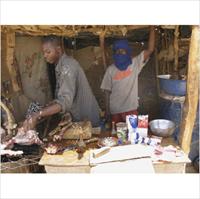BURKINA FASO: Food riots shut down main towns

Riots over the cost of living hit three major towns in Burkina Faso this week, a situation which has raised fears among some observers about the peaceful but impoverished country’s stability.
“This reaction was expected,” Laurent Ouédraogo, secretary general of the Confédération Nationale des Travailleurs du Burkina (CNTB) told IRIN, stating that the riots happened after anger welled up because of constantly rising prices for basics like food, cloth and petrol.
“Misery does not wait and you see people witnessing everyday rising prices and they do not know what to do. The situation is like having matches near cotton that can catch fire at any moment,” Ouédraogo said.
Protesters first swept onto the streets of Bobo-Dioulasso, the second largest city in the country, on Wednesday, when they attacked government offices and burned, shops, cars and petrol stations.
Protests continued in Bobo on Thursday when 100 people were arrested after a government delegation dispatched to make peace was stoned by rioters.
Similar protests erupted the same day in Ouhigouya, the third largest town in the country hundreds of kilometres north of Bobo-Dioulasso, and in another town in the west of the country, Banfora.
Government premises, mainly those of customs, taxes and street lights have been destroyed or burned by the demonstrators including merchants and traders who took on the streets to denounce mounting costs of taxes and goods.
The riots come two weeks after a government announcement that it was imposing “strong measures” to control the price of food and other basics which it said had increased by between 10 and 65 percent.
Life was returning to normal on Friday but soldiers, paramilitary and police forces could be seen at strategic points throughout all the towns and cities, as well as in the capital Ouagadougou, which had not seen any violence.
Speaking live on national television on 22 February, the Minister of Finance and Economy, Jean Baptiste Compaoré blamed high oil costs for the country’s woes.
“The government is working to find solutions, but the solution must be regional if we want a sustainable solution”, Compaoré said.
The government has confirmed it has been releasing emergency stocks onto the market to try to keep prices down. Some government officials said that informally customs has been blocking exports of grains and cereals, although this is not a nationwide policy.
The government also says it has also lowered taxes on some basic goods by between 30 and 35 percent.
Compaoré suggested the government having “dismantled” fraud techniques used by traders to avoid paying import and export taxes was the cause of the violence. “This is where it is painful for them,” he said.
The Africa Flak blog, which is written from Ouagadougou, reported on 22 February that some local press has blamed new government taxes for the high prices, which the government “strongly denies”.
Other parts of the local media “claim that the new reforming Prime Minister has struck down much of the culture of bribes that the customs agents had set up with larger food merchants and grocery distributors” the blog reported.
Riots over high food prices have already erupted in Burkina Faso’s Sahelian neighbours Mauritania and Senegal this year which are unusual in the region for being highly dependent on imported wheat and rice, products which have become more expensive worldwide this year.
In West Africa that situation is being compounded by unusually high food prices because of a disrupted growing season in some parts of the region in 2007 and reports that traders are hoarding stocks at markets in northern Nigeria, Ghana and elsewhere.
Another West African country, Guinea Conakry, is deemed among the most unstable countries in the world by conflict analysts, in large part because of five successive nationwide anti-government riots over the last 18 months sparked by mass discontent over the rising cost of living.
 Back and Next - Back and Next
Back and Next - Back and Next See Also - See Also
See Also - See Also